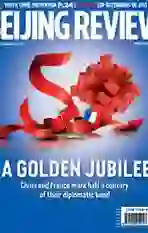Film and Capital
2014-02-17
China Newsweek January 6
At the end of 2013, Chinas annual box office hit 20 billion yuan ($3.3 billion), up 20 percent from the previous year. The new movie by director Feng Xiaogang, Personal Tailor, produced by Huayi Brothers Media Group and released nationwide on December 19, did surprisingly well at the box office despite being panned by critics.
Feng himself was confused by the fact. “I made a fluff film and it made 400 million yuan($66.08 million),” he said. “But when I made a serious film, it got nowhere.” Fengs dramatic picture was 1942, a film made around the end of 2012, which slumped at the box office.
What is going on in the Chinese film indus- try? In 2013, despite rapid growth, there was neither improved movie quality nor a matured film industry. Instead, it was a result of the chaos in the industry. The fact is, films no longer reach audiences simply by their stories, but are rather a chain of commercial operations.
In the current Chinese film market, films are bound too closely with the capital market. For instance, every time Huayi released a new film, the companys stock price went up or down with it, from a low of 12.17 yuan ($1.98) in December 2012 to a high of 80 yuan ($13.22) in October of 2013.
This shows the film market in China is not yet fully mature. The problem is that capital is not currently used to promote a sound development of the film industry, but is instead used for speculation. Ideally, however, the core of the film industry is not capital but innovation.
Shangri-la Blaze
Workers Daily January 14
A fire that broke out on January 11 in Dukezong Ancient Town in Shangri-la, a resort county in southwest Chinas Yunnan Province, has destroyed 242 houses and affected 335 families, but no deaths or injuries have been reported. The fire initially broke out at an inn and quickly spread to neighboring homes.
Narrow alleys and wood-structure houses as well as weather factors posed problems for firefighters, according to local authorities. But it is too late for excuses following this disaster.
In recent years, local government and enterprises have spent 200 million yuan ($33 million) and absorbed investment of 800 million yuan ($132 million) to build Dukezong Ancient Town as a tourist attraction. Nearly all families in the ancient town have joined in the tourism business. Tourism development brings huge revenues to local people, but they were unaware of the hidden danger behind the tourism boom.endprint
Though some ancient towns levy a toll on tourists, funds spent on environmental protection and restoration are still limited. Finding a balance between developing tourism and protecting historic constructions is a big challenge.
Junk Mail
Beijing Times January 14
Junk e-mail and short spam messages are becoming commonplace nuisances. According to statistics, there are 370 billion junk mails sent annually in China. Internet users have no better solution than to delete spam e-mails and messages. Some are even tricked by these messages and suffer economic loss.
The major reason is that telecommunication and Internet service providers turn a blind eye on it. Some service providers have even engaged in the business of mass texting. The sending of spam mails is a crime and will be punished with a fine of 30,000 yuan ($4,962) according to Chinese law. But in the face of huge potential economic ben- efit, some dare to take risks.
Telecommunication service providers should be held responsible for rampant junk mail that has damaged public interests. Technically, they have solutions to block junk mail for users. Therefore, the government should take a zero-tolerance attitude toward those junk mail producers and service providers.
Big Saving
Oriental Outlook January 2
The Central Governments strict policies to cut government spending have proved successful. Despite limited growth in fiscal revenue, the government balance hit a record high of 4,116.3 billion yuan ($680.01 billion) in October 2013, up by 801.8 billion yuan ($132.46 billion) compared to October 2012.
The tough policies were launched in December 2012, and it is estimated based on public reports that since then the country has saved hundreds of billions of yuan. This achievement showed the firm resolve of the new Chinese leadership led by Xi Jinping to cut government spending.
Of the spending cuts, the reception expenses and conference expenses have been reduced by about 30 percent. For instance, the conference fees have been controlled in an all-around way, including the conference size and other fees resulting from the conference such as accommodation and meals. Unnecessary conferences have been cancelled. And if issues can be dealt with via teleconferencing, a conference is not allowed.
And the reception costs have also dropped greatly. “I hope after a couple of years efforts, a new atmosphere can be formed in all levels of government across the country. People truly cooperate in joint efforts to do the job, and neednt improve the cooperation over banquets or alcohol consumption. This is not only about physical health, but also about the working relations between the superior and the subordinate, and between colleagues,” said Ye Qing, a Chinese anti-corruption expert.endprint
